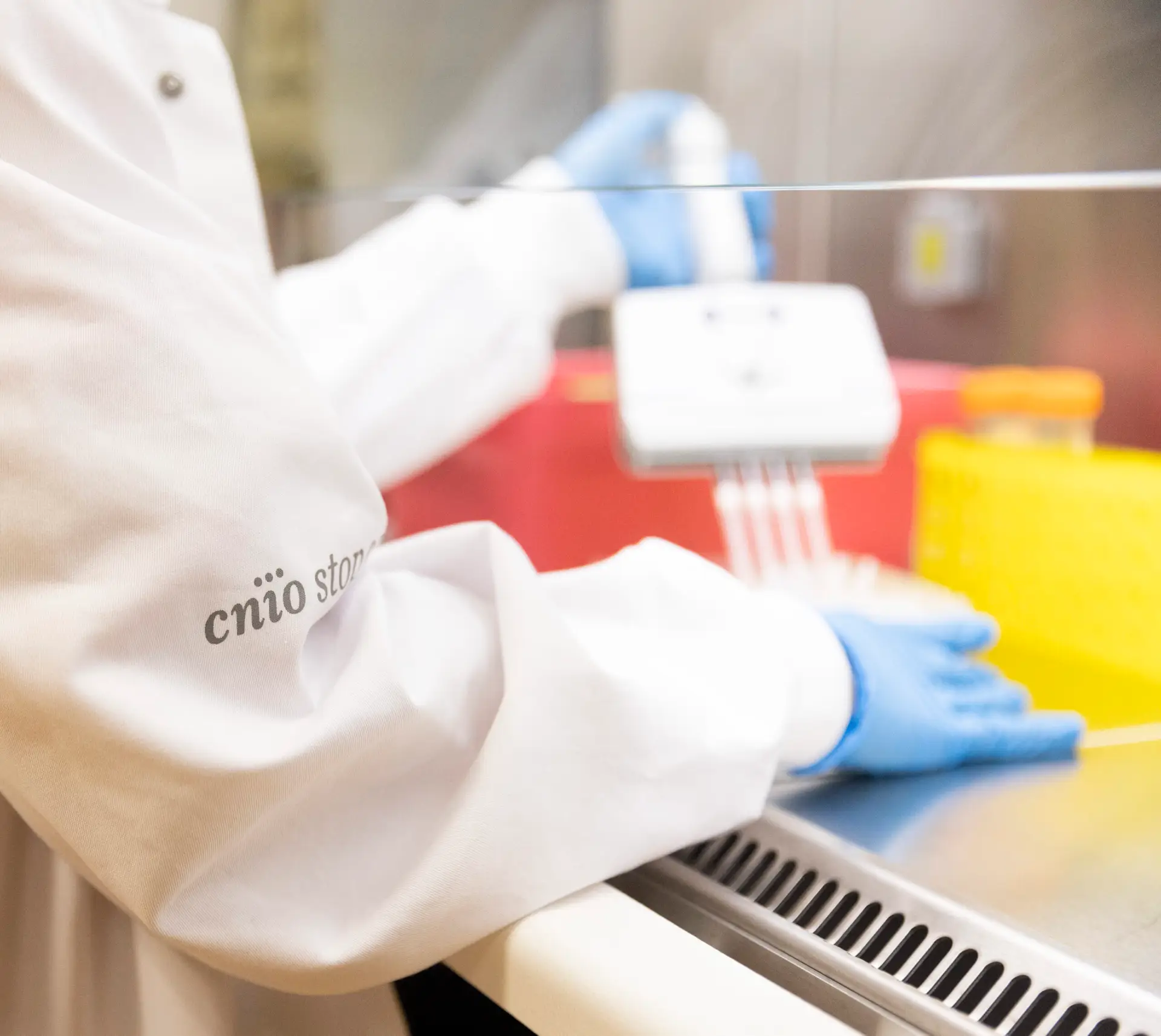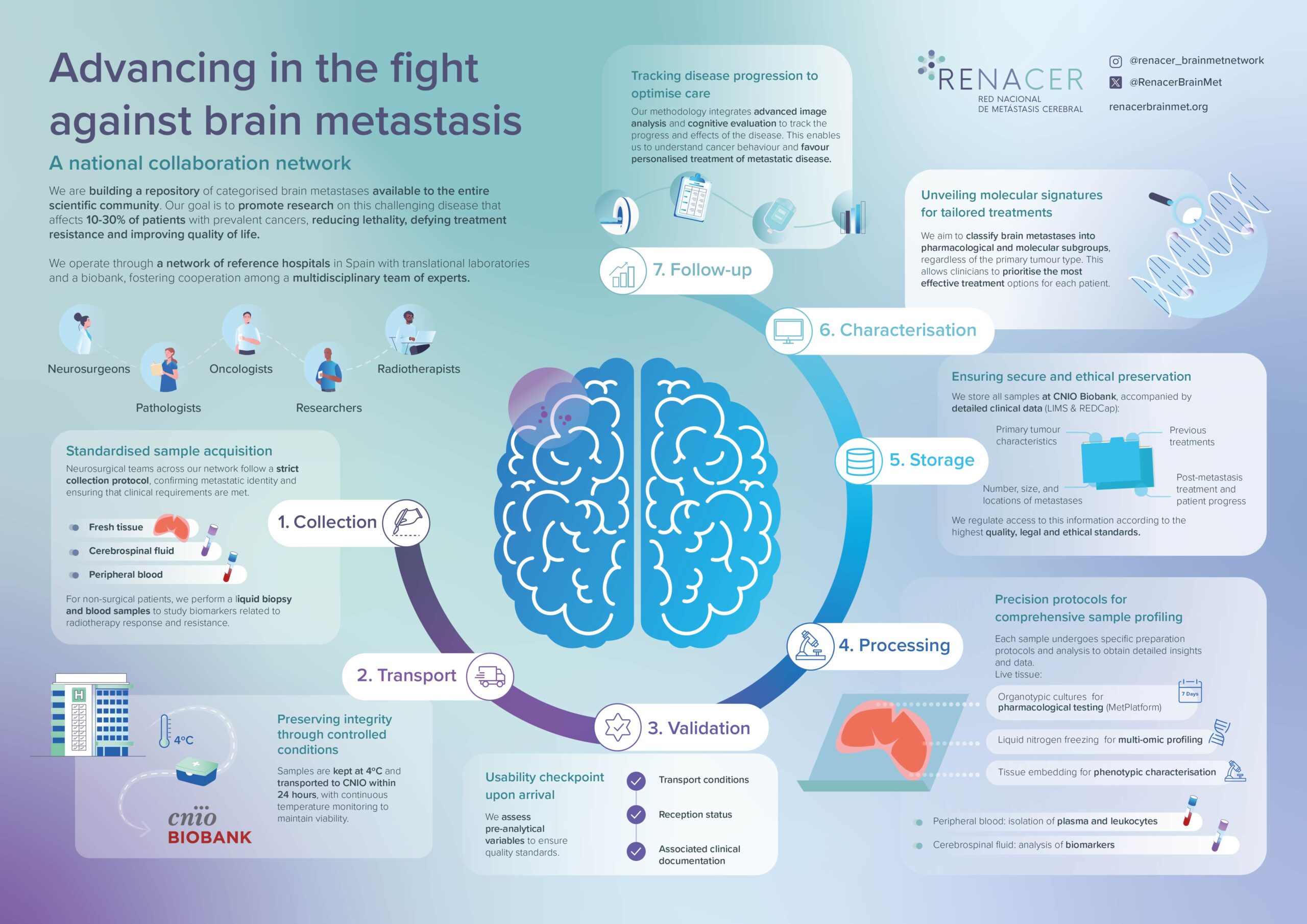- Brain Metastases
- RENACER
Brain metastases are the most frequent brain tumours with an emerging incidence, affecting one in three patients with advanced cancer (lung, breast and colorectal cancers, melanoma, etc.)
Current therapies available for most patients have a limited efficacy and fail to improve survival, due to the singular characteristics of brain metastasis (i.e., blood-brain-barrier, immune system, etc.), despite existing multimodal treatments and advances.
Therefore, interest abounds in understanding the mechanisms that drive brain metastases and its molecular characteristics, so that they can be targeted with preventive therapeutic strategies and therapy selection.
RENACER aims to disrupt the systemic strategy applied for brain metastases treatment, by leveraging new knowledge and understanding of this disease´s biology, processes and different evolution of brain metastasis aiming for a personalised treatment of metastatic disease.
Renacer

The Spanish National Brain Metastasis Network (RENACER), coordinated by the CNIO Brain Metastasis Group and the Biobank unit, consist of a cooperative framework of reference hospitals at the national level, basic/translational laboratories and a biobank, which work together with the aim of creating a unique collection of human samples and work strategy to encourage, promote and facilitate the validation and discovery of new molecular mediators, drugs and biomarkers, as well as the improvement of treatments for this disease.
In this regard, RENACER has established a national network pipeline to coordinate transversal efforts, which will be implemented and improved in this framework, and will be based on:
- The creation of a unique repository of brain metastases samples available to the Network and the entire research community to advance research (CNIO Biobank).
- Biologically, molecularly and genetically characterised brain metastases, allowing for microenvironment analysis as well as immunotherapies biomarkers and therapies validation (CNIO Brain Metastasis Group).
- Complemented with bioinformatics and clinical interpretation computational algorithms to establish the relevance of genomic and transcriptional alterations in cancer patients (CNIO Bioinformatics Unit).
- Completed with the incorporation of neurocognitive and “Quality of Life” assessment (Hospital U. 12 de Octubre Neuro-Oncology group).
- And supported by the application of machine learning and mathematical simulation models, to determine the prediction of drug response in in-silico brain metastases, facilitating the design of treatment strategies and trials; and the creation of “virtual” patients, analysing, among others, multimodal MR images, to enable non-invasive assessment of disease status. (Castilla-La Mancha University Mathematical Oncology Laboratory).
RENACER, A UNIQUE PIPELINE.
RENACER has a well-established work strategy that starts at the operating theatre at member hospitals removing patients’ brain metastases. Subsequently, the sample is shipped “alive” to the CNIO biobank within the following 24 hours, where the brain metastasis is handled and processed for multiple applications, with other relevant biological human samples.
Samples are submitted for genomic characterization and computational analysis for prioritizing drugs for patient-specific alterations (i.e., WES and RNA-Seq and computational algorithms).
However, the uniqueness of RENACER compared to other similar networks is that it generates Patient-Derived Organotypic Cultures (PDOC), which are “alive” thick slices of the metastasis that could be used for drug screening, via a novel drug screening platform, named METPlatform, where also the pro-tumoral components of the microenvironment are conserved.
All the different data resources and additional analysis implemented in this pipeline allow the creation of a unique repository of brain metastases analysed and categorised molecularly, pharmacologically and genetically within RENACER, completing a unique multiomic data profile of brain metastases available to the Network and the entire research community to advance research.
This will be completed with the incorporation of updated clinical information associated with patients’ cognitive and quality of life assessment. And the incorporation of their radiological monitoring, by multimodal MR imaging, to enable non-invasive assessment of disease status, as well as the development of mathematical simulation models for drug response prediction.
Thus, our approach is a powerful resource for metastasis research that integrates drug screening, omics approaches compatible with human samples and data, and neurological assessment of patients. This strategy is therefore clinically relevant, favouring personalised personalised treatment of metastatic disease in the brain.

AIMS & OBJECTIVES

Based on RENACER, the first National Brain Metastasis Network in Spain, we propose to follow a novel working strategy from several perspectives for the identification and validation of new candidates as potential drug targets and/or biomarkers, to reach specific clinically relevant goals that could be applied in the short term to cancer patients.
In this regard, within the network, it is being developed different parallel efforts to face the three pillars underlying the poor prognosis of Brain Metastases:
We aim to develop the next generation of personalised medicine by including molecularly-guided strategies based on the metastasis, and its implementation into clinical trials.
We will develop a strategy to genetically categorize and classify patients, allowing us to open a clinical trial with the top candidate drugs for specific therapeutic subgroups.
We intend to face resistance to therapy by two approaches, including a preventive strategy to avoid relapse post-surgery by targeting the microenvironment, and by optimizing immunotherapy to gain superior efficacy in the brain.
We will establish an index to predict relapse post-surgery and generate a clinical trial for an improved version of immunotherapy that works more effectively for brain metastases.
We plan to develop a novel therapeutic pipeline that helps preventing and/or reverting the deterioration of brain function.
We will initiate a novel therapeutic program to preserve the quality of life in patients with brain metastasis by developing imaging and molecular biomarkers of neurocognitive dysfunction and strategies to understand the underlying biology of brain metastasis-derived neurocognitive impact.
Interesting Publications
Mathematical modeling of brain metastases growth and response to therapies: A review
Beatriz Ocaña-Tienda, Víctor M. Pérez-García
Mathematical Biosciences, Volume 373, 2024, 109207, ISSN 0025-5564
Morphological MRI features as prognostic indicators in brain metastases
Ocaña-Tienda, B., Pérez-Beteta, J., Ortiz de Mendivil, A. et al.
Cancer Imaging 24, 111 (2024).
TIMP1 mediates astrocyte-dependent local immunosuppression in brain metastasis acting on infiltrating CD8+ T cells
Priego N et al.
Corresponding author/s: Valiente M
Cancer Discov (2025) 15 (1): 179–201.
Updating cancer research with patient-focused networks
Manuel Valiente, Eva Ortega-Paino
Trends in Cancer (2023), ISSN 2405-8033
The evolving landscape of brain metastasis
Valiente M, et al
Trends in Cancer. 4(3):176-196. (2018)
STAT3 labels a subpopulation of reactive astrocytes required for brain metastasis
Priego N, et al., Valiente M
Nature Medicine 24(7):1024-1035 (2019)
A clinically-compatible drug-screening platform based on organotypic cultures identifies vulnerabilities to prevent and treat brain metastasis
Zhu L, et al., Valiente M
EMBO Molecular Medicine (2022)
Stratification of radiosensitive brain metastases based on an actionable S100A9/RAGE resistance mechanism
Monteiro C**, Miarka L**, et al., Valiente M
Nature Medicine (2022)
Machine learning identifies experimental brain metastasis subtypes based on their influence on neural circuits
Sanchez-Aguilera A**, Masmudi-Martín M**, et al., Valiente M
Cancer Cell (2023)
Volumetric Analysis: Rethinking Brain Metastases Response Assessment
B Ocaña-Tienda, J Pérez-Beteta, JA Romero-Rosales, B Asenjo, A Ortiz, LA Pérez Romasanta, JD Albillo, F Nagib, M Vidal Denis, B. Luque, E. Arana, VM Pérez-García
Neuro-Oncoloy Advances 6(1), 1-9 (2024)
The local microenvironment drives activation of neutrophils in human brain tumors
Maas RR, Soukup K, et al., Joyce JA
Cell 186, 1-21 (2023)
Radiation necrosis after radiation therapy treatment of brain metastases: A computational approach
Beatriz Ocana-Tienda, Odelaisy Leon-Triana, Julian Perez-Beteta, Juan Jiménez-Sánchez, Victor M. Perez-Garcia
PLOS Computational Biology 20(1) e1011400 (2024)
Growth exponents reflect evolutionary processes and treatment response in brain metastases
Ocaña-Tienda, J. Pérez-Beteta, et al., V. M. Pérez-García
npj Systems Biology and Applications 9, 35 (2023)
A comprehensive dataset of annotated brain metastasis MR images with clinical and radiomic data
Ocaña-Tienda B, Pérez-Beteta J, et al., Pérez-García VM
Scientific Data 10, 208 (2023)
Renacer structure
Our scientific approach is supported by a multidisciplinary Steering Committee (SC), centralised at the CNIO, and several hospitals and organisations, covering clinic, research, bioethics, biobank and patients. The SC is currently made up of the following members:
- Managing Director: Mª Jesús Artiga, Scientific Director of the CNIO Biobank.
- Scientific Director of RENACER: Manuel Valiente, Scientific Director of the CNIO Brain Metastasis Laboratory.
- Clinician in the practice of Neurosurgery (Vice-Director and member for the Clinical Area): Ángel Pérez, Head of Section of the Neuro-Oncology Service of the Doce de Octubre University Hospital.
- Clinician in Neuro-Oncology (Vocal): Juan Manuel Sepúlveda, Coordinator of the Multidisciplinary Unit of Neuro-Oncology of the Doce de Octubre Hospital. President GEINO
- A Pathologist (Member): Elena Martínez Sáez, Member of the Pathological Anatomy Service of the Vall d’Hebron Hospital.
- One person responsible for cancer patient associations (Member): Begoña Barragán, GEPAC (Spanish Cancer Patient Group).
- One person responsible for bioethics (Member): Pilar Nicolás, ISCIII Ethics Committee. Professor at UPV/EHU Law School.
- Clinical Manager (Radiation Oncology) (Member): Sergi Benavente Norza, Radiation Oncologist at Hospital U. Vall d’Hebrón.
- Clinical Manager (Neuroradiology) (Member): Ana Ramos González, Head of Neuroradiology Section, Hospital U. 12 de Octubre.
- Responsible for work strategy (Bioinformatics) (Member): Fátima Al-Shahrour Núñez, Head of the Bioinformatics Unit, CNIO.
- Responsible for work strategy (Mathematical Models) (Member): Víctor Manuel Pérez García, Director of the Mathematical Oncology Laboratory (MOLAB) of the University of Castilla-La Mancha.
RENACER is also made up of a General Assembly of Representatives (AGR) made up of founding hospitals, members, and all those organisations that join after the founding of the Network.
During the years of operation, this collaborative model has been transferred to reference hospitals throughout Spain, becoming the backbone of this network and fundamental actors to promote research on this pathology.
If you are interested in joining the network or are interested in collaborating with it, please get in touch via email.